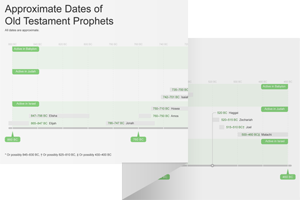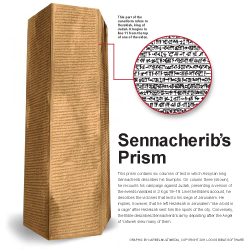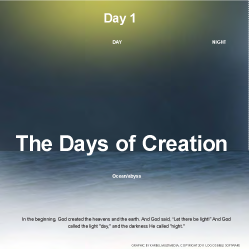1:1–31 The first chapter of Isaiah |
1:1 The vision of Isaiah This opening heading (or superscription) identifies the book as prophetic revelation associated with Isaiah the prophet. The books of Nahum and Obadiah are also identified as visions. Headings like this are common in ot poetry. This opening superscription does not necessarily indicate that Isaiah wrote the whole book.
 Prophetic Commissioning and the Divine Presence
Prophetic Commissioning and the Divine Presence
Isaiah The prophet’s name means “Yahweh is salvation.”
Isaiah’s ministry spans the reigns of four kings of Judah over a period of around 60 years, but most of his prophetic activity relates to the Syro-Ephraimite crisis during the reign of Ahaz |
Judah and Jerusalem The northern kingdom of Israel fell to Assyria in 722 bc, during Isaiah’s lifetime. This and other traumatic events provide the dramatic backdrop for Isaiah’s warning of impending judgment against the southern kingdom of Judah.
kings of Judah The full reigns of all four kings covers a period of about a century (790–687 bc). The reference to Uzziah’s death in Isa 6:1 suggests Isaiah’s ministry started around 740 bc. Compare Hos 1:1 and note.
1:2–20 Yahweh formally brings a legal suit against Judah for a breach of contract (breaking their covenant with Him). The accusation appears in Isa 1:2–3, followed by a direct address to the people outlining the charges detailed in vv. 4–20. |
1:2 heavens, and listen, earth Heaven and earth are called to witness God’s accusation against Israel. The word pair can be read as figure of speech (a merism) invoking all of creation.
accusation against Israel. The word pair can be read as figure of speech (a merism) invoking all of creation.
I reared children God is emphasizing His role as caretaker or master over Israel’s well-being; He cared for them like a father.
rebelled The Hebrew word for “rebel” is elsewhere used to describe political rebellion (see 2 Kgs 3:5–7). It indicates a breach of contract—when someone has not fulfilled his or her contractual obligation.
1:3 An ox knows its owner God’s children have shown less sense and loyalty than stubborn farm animals, who at least recognize their master’s role in providing for them.
Israel Here, “Israel” refers to God’s people generally, not just the northern kingdom. The vision is addressed to Judah and Jerusalem, the southern kingdom.
1:4 children Indicates that those being addressed are connected to God’s rebellious children in Isa 1:2.
the holy one of Israel This title for God is frequently used in Isaiah to emphasize the holiness of God. Isaiah’s experience in 6:1–13 may have profoundly impacted his vision of God, and led him to stress this aspect as central to God’s identity.
1:5 again Emphasizes Israel’s continued rebelliousness, which will provoke even more punishment against the already weakened nation.
1:6 the sole of the foot and up to the head The corporal punishment has been meted out head to toe. All levels of society will be affected by this judgment—from leadership to the common people. In 9:14–15, a similar metaphor is used to emphasize how Israel’s leaders failed her, from the elders and judges to the prophets who misled with lies.
bruise and sore and bleeding wound Depicts Israel as a person who is badly beaten from head to toe, yet stubbornly refuses to get help.
1:7 cities are burned with fire Assyrian annals indicate that Sennacherib’s invasion of Judah in 701 bc left 46 cities under siege or destroyed.
devastation by foreigners This verse may contain an allusion (or indirect reference) to God’s punishment of Sodom and Gomorrah in Gen 19. The Hebrew word mahpekhah (“overthrown”) is used elsewhere in the ot only to refer to God’s overthrow of those cities.
1:8 Zion Another name for Jerusalem, “Zion” symbolized God’s choice of the city as His dwelling.
the daughter of Zion Refers to Jerusalem. The city surrounded Zion and the temple—Yahweh’s dwelling place in their midst.
a booth in a vineyard The image of a temporary structure alone in the middle of a field emphasizes Jerusalem’s precarious position: after Assyria’s campaign against Judah in 701 bc, Jerusalem was weakened—but still standing.
like a city that is besieged In his annals, Sennacherib claims that he left Hezekiah trapped “like a bird in a cage.”
claims that he left Hezekiah trapped “like a bird in a cage.”
1:9 survivors, we would have been as few The fate of Judah’s survivors is a key theme of Isaiah (see 4:2; 10:20). Isaiah emphasizes that a remnant of Israel is left only because of God’s grace.
Yahweh of hosts This is a common title for God in Isaiah. It occurs over 50 times. God is commander-in-chief of the heavenly armies.
as Sodom God destroyed Sodom and Gomorrah for their wickedness (Gen 19). The prophets frequently referenced the cities to illustrate what God’s judgment looks like (see Isa 13:19; Jer 49:18; Amos 4:11; Zeph 2:9).
1:10 the word of Yahweh The prophets frequently used this phrase to legitimize their message: It is from God, not of their own making.
rulers of Sodom Isaiah both addresses and insults the leaders of Judah with this reference to Sodom—a proverbially wicked city (see note on Isa 1:9).
1:11–14 The prophets often criticized outward observance of rites and rituals when the people used it to mask inward rebellion, defiance, or disloyalty to Yahweh (compare 1 Sam 15:22; Amos 4:4–5; Mic 6:6–8). |
1:11 the abundance of your sacrifices An increase in offerings is meaningless without a change in attitude. The sacrifice represented Israel’s relationship of dependence on Yahweh. There was no point in going through the motions if they had abandoned that dependence—either through idolatry or pride in their self-sufficiency.
the fat of fattened animals The fat and the blood are the most important parts of the offering (Lev 1:5; 3:3–4).
burnt offerings of God’s insistence that He does not want burnt offerings would be surprising to the people of Judah. Leviticus 1 praises the burnt offering as a pleasing aroma to Yahweh (Lev 1:9).
the blood of bulls The fat and the blood are the most important parts of the offering (Lev 1:5; 3:3–4).
1:12 this from your hand: you trampling my courts Ironically, the people of Judah believed God required the elaborate sacrificial system now being condemned.
1:13 new moon Israel’s holy days included sacrifices for the new moon (Num 28:11–15). The new moon also represented an occasion for ritual feasting (1 Sam 20:5, 24). Work and travel was prohibited, similar to a Sabbath observance (2 Kgs 4:23).
Sabbath The weekly Sabbath was the central observance of sacred time in ancient Israel. Leviticus specifically commands that no work is to be done on the Sabbath (Lev 23:3).
the calling of a convocation Biblical law required three major festivals or convocations where all of Israel gathered to worship Yahweh. Leviticus 23:4–44 describes these festivals: the Feast of Unleavened Bread, the Feast of Weeks, and the Feast of Booths (Feast of Tabernacles).
1:14 new moons and your appointed festivals The observance of the new moon was important for keeping an accurate calendar and ensuring the feasts were celebrated at the proper time.
my soul hates God hates Israel’s empty religiosity in the very core of His being. The Hebrew word used here is commonly translated “soul” but more frequently used with reference to the life essence of a person. In some cases, “my soul” can simply mean “I.”
1:15 Your hands are full of blood Like sacrifices, prayers are pointless and ineffective due to the people’s rebellious attitudes and actions. “Blood” may refer to literal violence and murder, ritual uncleanness from improper animal sacrifice, or metaphorical staining from sinful attitudes (compare 59:3).
1:16 Remove the evil of your doings God calls for inward repentance after condemning the empty efforts of outward observance in vv. 11–15.
after condemning the empty efforts of outward observance in vv. 11–15.
1:17 Defend the orphan Righteous leadership always involves fair treatment of the weakest members of society—orphans, widows, and immigrants. This concern is evident in the Law (Deut 24:17), the Prophets (Isa 1:17; Jer 7:6; Zech 7:10), and Wisdom literature (Job 31:16–18).
1:18 let us argue The Hebrew verb here carries the sense of “to argue” or “to prove” in a legal context (see Job 23:7). It does not carry the sense of rational logic implied by the English “reason.”
scarlet The colors scarlet, red, and crimson call to mind the blood of Isa 1:15. The contrast with the white of snow and wool (symbolizing purity) reinforces the status of the people as impure and unclean because of their sins, which included injustice, bloodshed, and improper sacrifice.
1:19 the good of the land Obedience equals blessing, but disobedience equals judgment. The choice is also summarized in Deut 30:15–18.
1:20 the mouth of Yahweh has spoken Indicates the end of this section of accusation, and marks a transition to a lament over Zion. The phrase is used in Isa 40:5 and 58:14 to link later oracles of restoration back to this choice.
1:21–31 Jerusalem—the faithful city—has turned away from God (v. 21). Its rulers and its riches have become corrupt and require purification by fire (v. 25), which will result in the city’s restoration (v. 26). Zion will be redeemed, but those who corrupt her will be punished (vv. 27–31). |
1:21 How has a faithful city become like a whore? The Hebrew interjection here indicates the beginning of a new poem. The interjection also formally marks the poem as a “lament.”
has a faithful city become like a whore Israel’s unfaithfulness to God was tantamount to adultery. The prophets regularly compare God’s covenant with Israel to a marriage contract between husband and wife (Jer 3:6–10; Ezek 16; Hos 1:2). This image was typically used to shock God’s people into recognizing the seriousness of their rebellion.
1:23 They do not defend the orphan See note on Isa 1:17. The rulers are not following God’s standard of justice in caring for widows and orphans.
1:24 the Mighty One of Israel A unique variation on the poetic title for God as the “Mighty One of Jacob” (49:26; 60:16; Psa 132:2; Gen 49:24).
 The Name Theology of the Old Testament
The Name Theology of the Old Testament
my enemies God is referring to His own unfaithful people as “enemies” and “foes.”
1:26 the first This Hebrew term takes on special significance in Isa 40–55. There, the message of consolation is contrasted with the earlier message of judgment (see 42:9). God’s redemption is often described as restoring things to their former state, before they were polluted by sin.
the city of righteousness, faithful city The judgment is necessary to purge and purify Jerusalem, and restore its former righteousness and faithfulness.
1:27 will be redeemed by justice Isaiah 4:4 suggests God is the agent of redemption that comes through a “spirit of judgment.”
that comes through a “spirit of judgment.”
those of her who repent Since this Hebrew word can mean both “to repent” and “to return,” this verse may refer either to those who repent or to those who have returned to Jerusalem after the exile. In the Septuagint, the term is understood as “her captives”—another possible reading of the word.
1:29 the gardens The references to oak or terebinth trees and gardens likely allude to Canaanite religious practices, possibly including the Asherah poles that Hezekiah cut down in 2 Kgs 18:4.
1:30 like an oak withering its leaves The metaphor is extended from religious practices to the biological impact of cutting a garden off from its source of life.
1:31 there is not one to quench Both the rebellious leaders of Judah and the product of their labor (idols for worship) will be destroyed in the judgment to come.

|
About Faithlife Study BibleFaithlife Study Bible (FSB) is your guide to the ancient world of the Old and New Testaments, with study notes and articles that draw from a wide range of academic research. FSB helps you learn how to think about interpretation methods and issues so that you can gain a deeper understanding of the text. |
| Copyright |
Copyright 2012 Logos Bible Software. |
| Support Info | fsb |
 Loading…
Loading…


 Isaiah
Isaiah 

